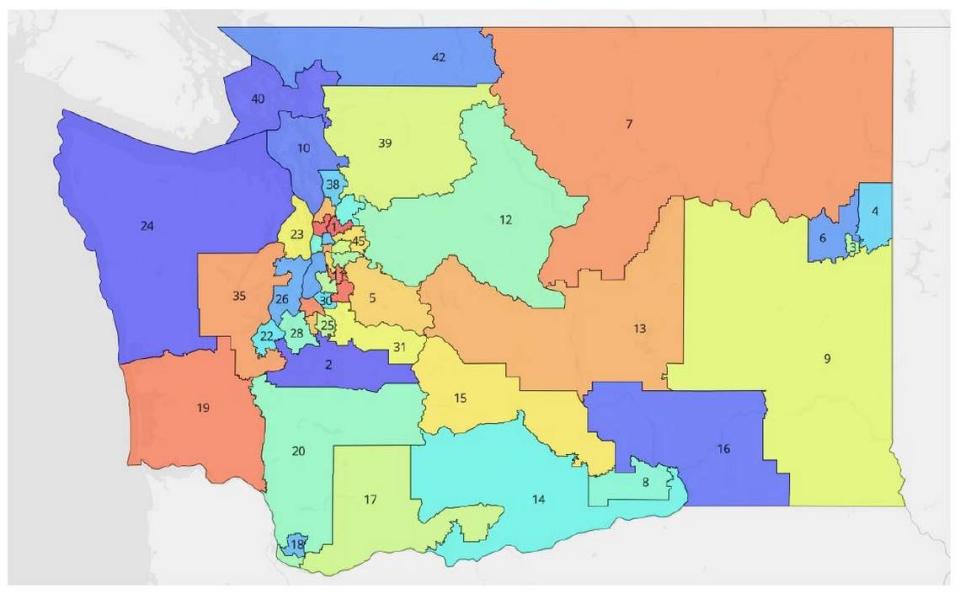U.S. Supreme Court refuses to block WA maps ousting Central WA’s first Latina senator
- Oops!Something went wrong.Please try again later.
- Oops!Something went wrong.Please try again later.
A Tri-Cities lawmaker drawn out of her home legislative district last month by a federal judge in Seattle says she’s “considering everything” as she looks forward to the final two years serving in her seat.
And on Tuesday, the U.S. Supreme Court declined an emergency stay that would have blocked the new map from being used in elections this year. Associate Justice Elena Kagan referred it to the high court, which rejected it without comment.
A lawsuit in the U.S. Court of Appeals in the Ninth Circuit will resume, though, with briefs expected in the next couple months, according to reporting from the Washington State Standard.
The legal scramble is a result of the March 15 order by Judge Robert Lasnik, of the U.S. District Court for the Western District of Washington, in the Trevino v. Palmer case.
Lasnik mandated the use of a new and remedial map after his court determined on Aug. 10 that the redrawn legislative district boundaries made by the Washington Redistricting Commission in 2021 violated the Voting Rights Act and diluted Latino electoral influence in Yakima Valley.
The court ruling and new map have become a lightning rod for Washington state politicians, with Republicans denouncing it as a partisan gerrymander and Democrats blessing the decisions as a benefit to Central Washington Latinos.
Thirteen of Washington’s 49 legislative districts saw changes with the court-appointed map.
And it also had some unintended consequences, too: Five state lawmakers — including state Sen. Nikki Torres, R-Pasco — found their properties and homes drawn out of the districts they represent.

In an interview a few days before the Supreme Court denial, Torres told the Tri-City Herald she wasn’t planning to make any hasty decisions in response to this legal issue that’s been percolating for more than two years.
“I’m just looking at what’s feasible and what’s going to work the best for me and my family,” said Torres, a Latina.
“I won’t have a decision this year. I’m just going to play it by ear and see what we decide, me and my family. For now, it’s not feasible to up and do anything crazy,” she continued.
Torres was drawn out of Washington’s 15th Legislative District. If she doesn’t move, she may have to challenge fellow Republican lawmakers in the 16th Legislative District to remain in Olympia.
Central WA’s first Latina senator
The Pasco lawmaker has been one of the most productive freshman senators in the Washington Legislature. She’s also the first Latina senator to ever represent Central Washington, and the only Republican Latina in the Legislature.
She was the primary sponsor on roughly 38 bills in her first two years in the Legislature, working at the state level to address issues related to housing, public safety, the economy and public schools.
Democratic Gov. Jay Inslee signed four of Torres’ bills into law in the weeks after the 2024 session.
Those include changes, as well as new funds and programs, to help hire more public defenders, especially in rural and underserved communities (SB 5780); expand safety training to include substitute teachers and other temporary school employees (SB 5647); increase per diem days for the state’s largest fire departments (SB 5925); and streamline government land annexations (SB 5885).
“She is someone who can work in a bipartisan fashion,” said Sen. Jesse Salomon, D-Shoreline, in an email.
Salomon serves as vice chair of the Local Government, Land Use and Tribal Affairs Committee, where Torres also serves as a ranking member.
“She worked to pass a bill to get more public defenders to work on the east side of the mountains. That is a bipartisan issues,” he continued.
Since coming into office, Torres has tried to pass a bill that would require state agencies to clearly identify programs and services that can be utilized by undocumented children whose families immigrated to the U.S., also known as the federal Deferred Action for Childhood Arrival (DACA).


“When I used to work for the (Tri-Cities) Hispanic Chamber of Commerce, I used to meet with groups. One of the groups I met with included a couple students, young adults. They mentioned, ‘We’re DACA recipients. We can’t get professional licenses,’” Torres said.
She describes the bill, SB 5631, as a “government efficiency bill” that lends a hand to Washington’s 30,000 DACA recipients.
Torres said she’s intentional about introducing “sensible,” “bi-partisan” bills that benefit everyday Washingtonians and helps keep workers and residents safer.
She’s a first-generation American whose family came from Mexico without documentation, and she grew up in a family of agriculture workers.
“I have a lot of family here and cousins. Some are DACA and some are born here. Just having that representation, too, I think that’s what really pushed me to run for the (the Legislature),” she said.
Pending any substantial legal changes, Torres will be allowed to serve out the rest of her term, which expires at the end of 2026, as Senator of Washington’s 15th Legislative District.
Her priorities over the next two years include changes to child care, combating human trafficking, seeing what comes of the state Missing and Murdered Indigenous Women and People Task Force, and continuing work to retain and recruit public defenders.
U.S. Supreme Court request
Although Democrat-appointed state redistricting commissioners turned down an opportunity by the U.S. District Court to reconvene and draw up a more fair map, Torres said she still believes the bi-partisan redistricting model remains the best method that Washington can use to redraw its boundaries every 10 years after the U.S. census.
“It provides transparency and it gives people from both sides (the opportunity) to choose members who can be part of that committee,” she said, adding that it tapers expectations from outside special interest groups.
But she argues Judge Lasnik’s map disenfranchises Hispanics while helping Washington Democrats make gains in Central Washington.
The judge’s new map swaps Latino voters and Democratic voters between the 14th and 15th Legislative Districts, giving Democrats a new 15-point advantage in the 14th. Additionally, the percent of Hispanic voting age population in Torres’ district, the 15th, dropped by 38 points to create a new majority-minority district in the 14th.
“The Latino community of interest that stretches from east Yakima, through the smaller Latino population centers along the Yakima River, to Pasco is unified in a single legislative district,” Lasnik asserted in his March 15 order.
“... the new configuration provides Latino voters with an equal opportunity to elect candidates of their choice to the state Legislature, especially with the shift into an even-numbered district, which ensures that state Senate elections will fall on a presidential year when Latino voter turnout is generally higher,” he continued.
In the emergency stay request filed to the U.S. Supreme Court, attorneys representing Jose Trevino, Ismael Campos and state Rep. Alex Ybarra, R-Quincy, described the state’s new 14th as an “octopus slithering along the ocean floor” with its tentacles strewn about.
The attorneys also included details of Torres’ 2022 general election victory as an example that Latinos could handily win the district — she trounced an opponent in a 36-point landslide to earn her first term.

